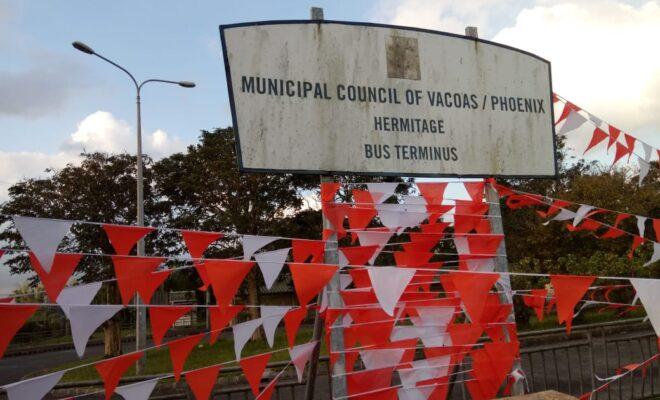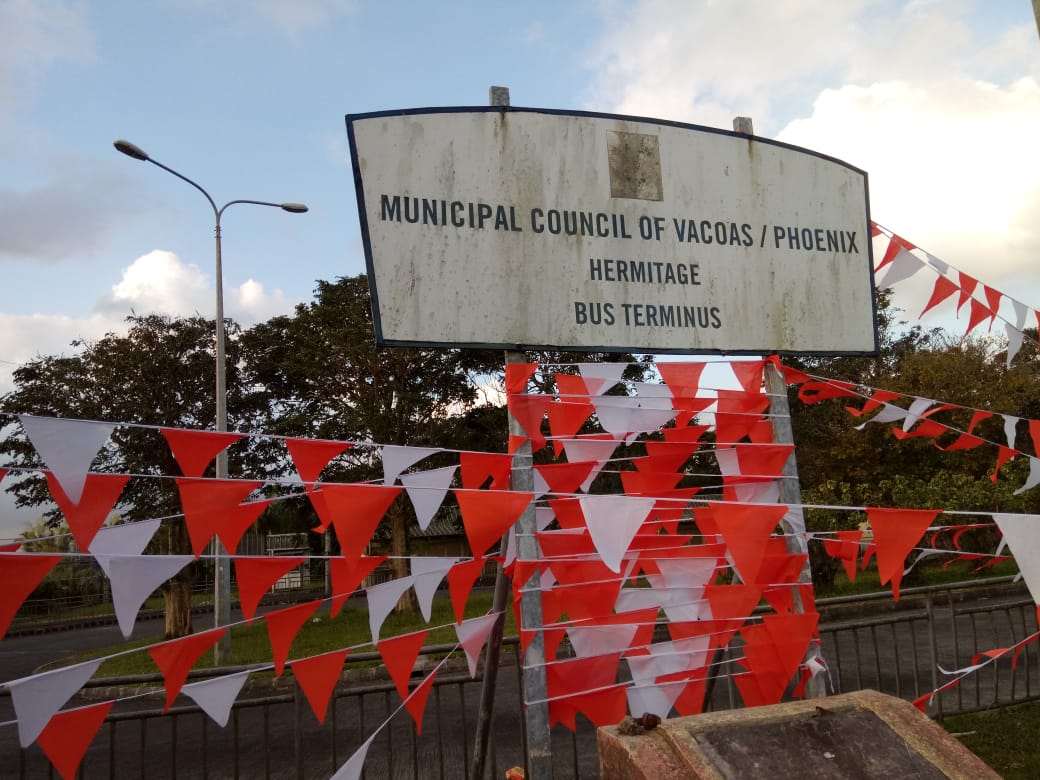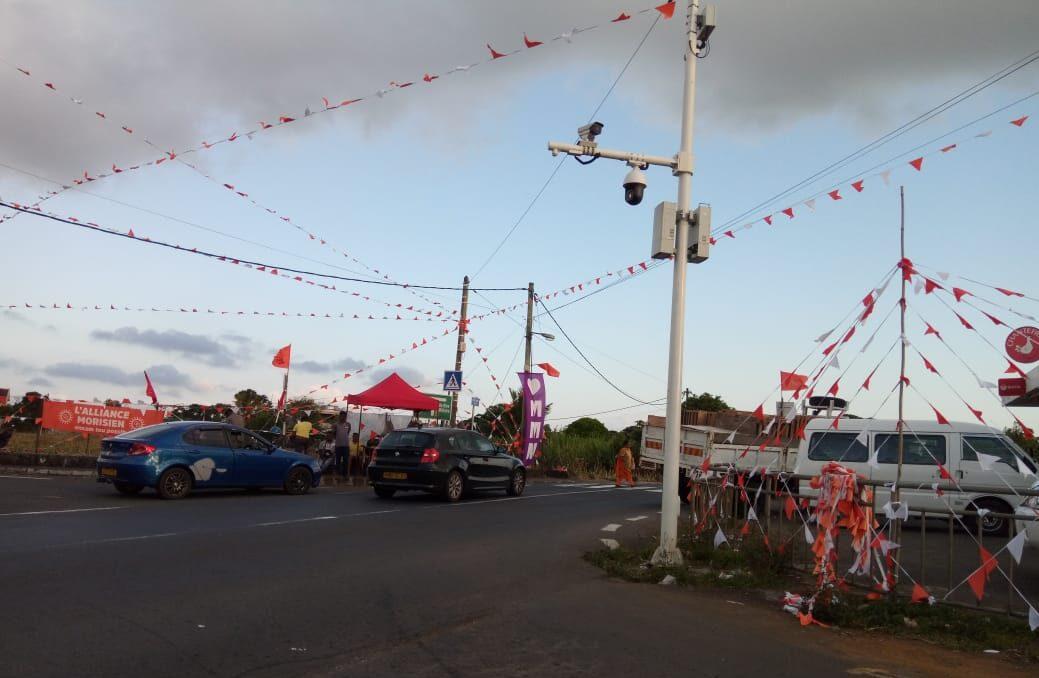Mauritius’ micro-politics: Everybody needs good neighbours

In some elections, people vote for the soul of their nation. In Mauritius, they vote for their neighbours.

In the run-up to Mauritius’ 7 November elections, political parties have strung up bunting in their colours across the country. Credit: Jess Auerbach.
Politics in Mauritius is perhaps unique in the world. On this tiny speck in the Indian Ocean, there is no indigenous population. Everyone in this hugely diverse population of 1.2 million people descends from migrants whether from Africa, Asia or Europe. How are elections fought and won in a country like this?
On 7 November, Mauritians will provide the answer in hotly-contested national elections. Incumbent Prime Minister Pravind Jugnauth of the ruling Militant Socialist Movement (MSM) will be vying to stay in power, having been promoted from Finance Minister to top office in January 2017 by his outgoing father and predecessor. Former Prime Ministers Navin Ramgoolam of the Labour party and Paul Bérenger of the Mauritian Militant Movement (MMM) will be trying to replace him.
At stake are a range of issues – such as care for the elderly, debt, economic growth, infrastructure and tourism – and candidates have been out campaigning on competing platforms. The country is covered in brightly coloured bunting: orange for the MSM; purple for the MMM; red and blue for Labour and its Parti Mauricien Social Démocrate (PMSD) coalition partner.
On the surface, this might appear to be a fairly familiar type of election in the mould of similar electoral democracies around the world. Underneath, however, there are much more complex and uniquely Mauritian dynamics at play.
Winners and best losers
At independence in 1968, political ideology arguably did matter. Half a century later, and following several transitions of power, it’s hard to make the same claim. Instead, winning elections has largely become a strategic game of running the right candidates – as defined by caste, class, and religion – in the right places. Garnering votes from a population made up of numerous different “communities” has primarily become about offering as many micro-electorates as possible a candidate they trust will cater to their needs.
The country’s very electoral system is a fascinating example of what happens when difference is a given. In Mauritian elections, people are divided into 21 constituencies. The twenty constituencies on mainland Mauritius each elect three MPs. The one constituency on the smaller island of Rodrigues returns two. Members are elected on a first-past-the-post system.
So far so (relatively) normal. At this point, however, Mauritius’ ingenious (if highly contested) “Best Loser” formula is applied to ensure no group is excessively under-represented. In a process that makes the selection of a Pope seem simple, data from the 1972 census is used to determine which communities have not won a “sufficient” number of seats. Eight candidates who lost their contests but are from groups deemed to be “under-represented” through first-past-the-post are allocated seats to ensure “everyone is represented in Parliament”.
This system is not without its critics. To begin with, it requires every candidate to register as being in one of four groups. The Constitution states: “the population of Mauritius shall be regarded as including a Hindu community, a Muslim community and Sino-Mauritian community; and every who does not appear, from his way of life, to belong to one other of those 3 communities shall be regarded as belonging to the General Population, which shall itself be regarded as a fourth community.”
Some object to dividing up the population in this way and, on Saturday, a Supreme Court judge ruled yet again against candidates who refused to declare their “community”. The verdict barred the participation of both groups and individuals who wished to run simply as “Mauritian”.
Even if one accepts that religion and ethnicity are appropriate determinants of electoral office, the groupings listed in the constitutional are controversial. The categories of “Hindu”, “Muslim” and “Sino-Mauritian” (Chinese) are rife with unwritten subdivisions. Meanwhile, the notion of “General Population” is remarkably clumsy. The latter lumps together Mauritius’ large number of Creoles – the historically-marginalised descendants of African slaves – with everyone else who doesn’t “fit” into the other three options. It includes people of mixed heritage, recent immigrants, and atheists (though if the latter are deemed to practice a “way of life” that reflects Hinduism or Islam in some way, they might be reclassified by popular perception). Creoles are served a double-whammy of structural discrimination by virtue of voting districts that are also demarcated against them.
Finally, the demographics of Mauritius have changed significantly in the 47 years since the 1972 census. It’s possible, for example, that Hindus are no longer the majority and the UN has made it clear that Mauritius should at the very least base its actions on accurate numbers. Efforts have been made to reform the system. But even the government-appointed Sachs Commission in 2001 failed to map out a viable pathway for change. That’s partly because power is vested in the current the system and partly because of a genuine nationally-shared concern at the potential consequences of rocking the “ethnic” boat.

More bunting and banners at an intersection. Credit: Jess Auberach.
Personal politics
Whether one supports the electoral system or not, it’s clear that Mauritian society is divided up into far more categories than the four outlined in the constitution. It is along far more intricate divisions within those categories that elections are fought and won. In the Hindu community, caste is of the utmost importance. In the other three groupings, class is often the deciding factor.
The easiest way for political parties to win seats is to map out these sub-divisions across the country and run candidates of the “right” background in the right areas. A crucial part of the campaign therefore is to chart in meticulous detail not just the number of, for example, Hindu voters in a given area, but which are Telegu, Marathi, Ravived, Rajput, Vaish, Tamil or Maraz. Parties work out which Muslims are Surtees, Maymons or Kalkutyas. They distinguish between poorer and richer Creoles, Catholics and the Assembly of God. Nuances are made between the Franco-Mauritian aristocracy and working classes, and sometimes between Hakka- and Cantonese-speaking Chinese.
If a party can work out these divisions and have enough candidates of the “correct” identity to send to the appropriate constituencies, they will do well. Mauritius is small enough and people’s lives so closely intertwined that a savvy voter can scan a list of candidates and, from the names alone, guess a politician’s religion, class and family background. With a few strategic phone calls, they can usually find out which school the candidate’s children attend and at which supermarket they buy their groceries.
Around elections, this politics gets personal and vicious. Dirt-digging becomes a national sport and everyone with an axe to grind mobilises. There are no actual axes, though – the only weapons are rumour, gossip, the occasional leaked email or bank statement, and traditions of spreading Fake News that have existed a lot longer than Facebook.
This is not to say that other factors don’t play some role. Voters will have opinions about the performance of national parties as a whole and their policies, but these concerns figure much less than their judgement of individual politicians and ministers. Politics quickly boils down to the personal, especially since all parties’ proposals are essentially variations on the same broad welfare state. Voting decisions are less about abstract ideology than the individuals running and their perceived ethnicity, trustworthiness and (sometimes!) qualifications.
“Everybody needs their piece of power”
After elections in Mauritius, these dynamics quickly die down. People put away their political bunting and banners, stop repeating nasty stories and return to good neighbourly relations. The winning candidates will take their seats under the assumption they will serve their nation and constituents, but with the needs of their family and extended “community” coming first. The losers will accept the results in the knowledge they will have another chance in five years. At election time, as almost always, there will likely be a remarkable tolerance whatever the results. This is expressed in the often-repeated Bhojpuri phrase jay de – “just let it be”.
This attitude was captured in a recent conversation with a friend. He explained that he had to find a way to ensure members of his caste, which he feels is becoming increasingly marginal, are elected into office. In the same breath, however, he insisted that every Mauritian has a right to live in peace. He summarised: “As long as it’s fair, of course, everybody needs their piece of power and they need to be able to live their lives.”
This approach to politics is a world apart from most electoral democracies where voters are told their ballots will shape the future of their nation. Mauritians would never fall for such a con. Among other things, they understand that their islands are but tiny specks in a global system in which many things are beyond even the Prime Minister’s control. Whether the incumbent Jugnauth (the son of Mauritius’ second premier) extends his reign or Ramgoolam (the son of the first) returns for another round, they know that much will stay the same.
Instead then, most Mauritians will vote at a very local scale for people they often know personally and who, in some way, they either trust or admire. Despite significant criticism, most of these people will be men. If those candidates perform well once elected, they may stay in power for generations. If they don’t, they have to answer the electorate eye-to-eye for years to come.
Diversity has never been in question in Mauritius – of perspective, of ancestry, of god(s) – and it’s not in question now. The political system certainly entrenches micro-politics, racism, and religious segregation. Ideologically, it is obviously deeply flawed. And yet it also somehow works and, whichever way you look at it, Mauritians live better now than they did a few generations ago.
In this age of broken democracies, Mauritius provides an interesting example for the world to ponder of politics at a more manageable scale.






The article on Mauritius election is precise and showed exactly the way people reacts. The author is totally right on the overall analysis. Good job. Thanks.
Detailed analysis of the interrelationship between politics and culture clearly communicated. Thanks your articulation was helpful and honest.
The article depicts the reality of political game in Mauritius, in my perception. Mauritians are always in good terms to one another, be it before, during or after election. They take the result of any election as a sport outcome, accepting it.
chloroquine https://chloroquineorigin.com/# hydroxichlorquine
cialis dosage cialis 20mg
buy hydroxychloroquine canada hydroxychloroquine over the counter hydroxychloroquine 200 mg high